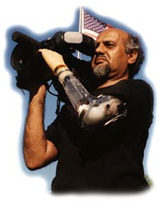Thursday, March 31, 2005
Surprise, surprise -- but a shame it took bad publicity to reverse this case of incompetence and insensitivity by the Department of Work and Pensions.
"Bloody people. I can't bear them," said Prince Charles of the press at his annual skiing photocall in Switzerland this morning.
Chuck -- the feeling's mutual.
Chuck -- the feeling's mutual.

In June, I'll be taking the trip of a lifetime to the Galapagos Islands.
According to the lead story in today's Independent it's just as well I'm going sooner rather than later. The Indy says environmental disaster is looming in the archipelago because of moves to introduce damaging long-line fishing.
My favourite quote from the article:
"Last year, an attempt to enforce a limit on sea-cucumber harvests...angered Galapagos fishermen, who threatened park rangers with petrol bombs and in one incident took 30 scientists and a number of the islands' giant tortoises hostage."
Give us the sea cucumbers or the tortoise gets it.
Wednesday, March 30, 2005
BBC News Online picks up on the outrageous story of Iraq war victim Ali Abbas's problems with mindless bureaucracy.
Ali's guardians have been told his claim for Disability Living Allowance can't be backdated.
The reason? Civil servants say Ali's carers can't prove when he was injured -- even though the youngster's case was covered by just about every media outlet in the country and was the subject of a book and TV documentary.
The furore over this shocking case of incompetence by the Department of Work and Pensions will almost certainly mean that Ali will receive the back pay he deserves.
But how many thousands of less high-profile people with disabilities aren't so fortunate?
Ali's guardians have been told his claim for Disability Living Allowance can't be backdated.
The reason? Civil servants say Ali's carers can't prove when he was injured -- even though the youngster's case was covered by just about every media outlet in the country and was the subject of a book and TV documentary.
The furore over this shocking case of incompetence by the Department of Work and Pensions will almost certainly mean that Ali will receive the back pay he deserves.
But how many thousands of less high-profile people with disabilities aren't so fortunate?
The Vatican has just announced that the Pope is getting nutrition from a feeding tube through the nose.
Reports that Michael Schiavo is petitioning to have it removed cannot be confirmed.
Reports that Michael Schiavo is petitioning to have it removed cannot be confirmed.

I've just finished Hugh Miles's new book tracing the history of Al Jazeera -- and the impact it has had on Arab broadcasting and wider political debate in the Middle East and beyond.
It's an immensely readable, if hugely partisan, account.
Miles recently took part in a panel discussion at the Frontline Club.
I couldn't make it to the event, but I've just received the transcript.
The wide-ranging debate covers the claims that Al Jazeera encourages terrorism, America's half-baked attempts at setting up rivals to the channel and the row over whether US forces deliberately target journalists.
It's well worth reading.
Hugh Miles also did a recent interview on NPR's Fresh Air. Listen to it here.
Thanks to Alistair for this link from NPR's All Things Considered.
It's a fine report by Lourdes Garcia-Navarro on the six month wait for prosthetics faced by amputees in Baghdad because of a shortage of manpower and materials.
I know all too well how vital a well-made and comfortable artificial limb is to an amputee.
It's not an exaggeration to say my prosthetist is one of the most important people in my life.
Thanks to the care I've received, most days I barely think about my leg.
I click it on in the morning and am able to walk, cycle, run and work. In fact, I'm probably fitter than most people with two feet.
But the moment something goes wrong -- a rash, an infection, or a poorly-fitting limb -- I immediately become an invalid. The simplest task becomes a major challenge.
My ability to get on with daily life is almost entirely dependent on the carbon fibre, titanium and fibreglass contraption attached to my right tibia.
In a different life, any one of the amputees in the NPR report could have been me.
It's a fine report by Lourdes Garcia-Navarro on the six month wait for prosthetics faced by amputees in Baghdad because of a shortage of manpower and materials.
I know all too well how vital a well-made and comfortable artificial limb is to an amputee.
It's not an exaggeration to say my prosthetist is one of the most important people in my life.
Thanks to the care I've received, most days I barely think about my leg.
I click it on in the morning and am able to walk, cycle, run and work. In fact, I'm probably fitter than most people with two feet.
But the moment something goes wrong -- a rash, an infection, or a poorly-fitting limb -- I immediately become an invalid. The simplest task becomes a major challenge.
My ability to get on with daily life is almost entirely dependent on the carbon fibre, titanium and fibreglass contraption attached to my right tibia.
In a different life, any one of the amputees in the NPR report could have been me.
Tuesday, March 29, 2005
Reopening this posting, James from Clear Path International has an update on 13 year-old Ho Van Nghia, who lost both his legs below the knee, his left arm below the elbow and some fingers in his right hand when a bomb he was trying to salvage for scrap exploded in his front yard.
Back from an Easter break which remained blissfully uninterrupted by matters Papal.
It meant I was able to spend some time putting together a proposal to cycle across Death Valley later in the year to raise loads of lovely money for MAG.
If there are any dot com millionaires out there (do they still exist?) who'd like to be the headline sponsor for the event -- in the knowledge that they'll be helping stop little children from having their arms and legs blown off by landmines -- speak up now.
£3,000-£4,000 in corporate sponsorship will enable the challenge to go ahead.
It meant I was able to spend some time putting together a proposal to cycle across Death Valley later in the year to raise loads of lovely money for MAG.
If there are any dot com millionaires out there (do they still exist?) who'd like to be the headline sponsor for the event -- in the knowledge that they'll be helping stop little children from having their arms and legs blown off by landmines -- speak up now.
£3,000-£4,000 in corporate sponsorship will enable the challenge to go ahead.
Thursday, March 24, 2005
The Pope, Prince Rainier of Monaco and Terri Schiavo -- all at death's door and all requiring expensive news coverage at the end of the financial year.
Can't they wait until April 1st before checking out?
Can't they wait until April 1st before checking out?
Following today's front page news, there's debate in the newsroom over what Anthony Massey tasted like when he was mauled by the now-Director General of the Corporation.
Probably chicken is the general consensus.
Probably chicken is the general consensus.
Breakthrough prosthetic technology -- for cats.
MARK THOMPSON ATE MY COLLEAGUE

Today's lead story in the Mirror, which also makes the front page of the Guardian, has been part of newsroom folklore for years -- but because this office leaks like a broken sieve it's now common knowledge.
The moral of the story: Don't put anything into an e-mail that you wouldn't want to read on the front page of a national newspaper.

Today's lead story in the Mirror, which also makes the front page of the Guardian, has been part of newsroom folklore for years -- but because this office leaks like a broken sieve it's now common knowledge.
The moral of the story: Don't put anything into an e-mail that you wouldn't want to read on the front page of a national newspaper.
Wednesday, March 23, 2005
Tuesday, March 22, 2005
The New York Times (registration required) has a lengthy article on people who feel compelled to have healthy limbs amputated -- a condition known variously as body integrity identity disorder, apotemnophilia or factitious disability disorder.
It's a subject I've written about many times in the past.
While accepting that psychiatric conditions often defy rational explanations, many of us who have lost limbs in traumatic circumstances feel horror and disgust towards anyone who actively seeks to have a healthy arm or leg removed.
Paddy Rossbach, president of the Amputee Coalition of America, puts it mildly:
"It's very difficult for people who have been through what they consider to be a devastating life experience to understand why anybody would want to mutilate himself in this way, especially when so many people are having tremendous problems with prosthetic fittings, or access to prostheses, and are living with pain every day of their lives."
It's a subject I've written about many times in the past.
While accepting that psychiatric conditions often defy rational explanations, many of us who have lost limbs in traumatic circumstances feel horror and disgust towards anyone who actively seeks to have a healthy arm or leg removed.
Paddy Rossbach, president of the Amputee Coalition of America, puts it mildly:
"It's very difficult for people who have been through what they consider to be a devastating life experience to understand why anybody would want to mutilate himself in this way, especially when so many people are having tremendous problems with prosthetic fittings, or access to prostheses, and are living with pain every day of their lives."
Monday, March 21, 2005
A special report on the American intelligence services in this week's Economist quotes the 1st-century Roman satirist, Petronius Arbiter, who said:
"We tend to meet any new situation in life by reorganising...And what a wonderful method it can be for creating the illusion of progress while producing confusion, inefficiency and demoralisation."
An apt quote, perhaps, given today's announcements at the the BBC and the United Nations.
"We tend to meet any new situation in life by reorganising...And what a wonderful method it can be for creating the illusion of progress while producing confusion, inefficiency and demoralisation."
An apt quote, perhaps, given today's announcements at the the BBC and the United Nations.
A cautionary tale for all those who think the mainstream media is obsolete now that all the real journalism is being done by bloggers.
Boing Boing notes that Canadian blogger Jeremy Wright may have been denied entry to the US because he didn't have a media "I" visa in his passport.
Leaving aside the question of whether someone who tells immigration their profession is "blogger" deserves a damn good slap, Wright deserves little sympathy.
You want to be a journalist? You fill out the paperwork and spend half a day queueing at the US Embassy for your I visa like the rest of us have to.
Boing Boing notes that Canadian blogger Jeremy Wright may have been denied entry to the US because he didn't have a media "I" visa in his passport.
Leaving aside the question of whether someone who tells immigration their profession is "blogger" deserves a damn good slap, Wright deserves little sympathy.
You want to be a journalist? You fill out the paperwork and spend half a day queueing at the US Embassy for your I visa like the rest of us have to.
It's the day of the long knives, as the DG prepares to cull hundreds of jobs.
I've been given a steer that my job is safe -- but many people in the building won't have such good news this afternoon.
I've been given a steer that my job is safe -- but many people in the building won't have such good news this afternoon.
Sunday, March 20, 2005
A real confidence-boosting day.
Three weeks from now I'll be putting the Cheetah to the test in my first ever 10k run.
Having never taken part in a race when I had two feet, I was more than a little unsure how I'd manage now I have one.
My training programme is paying real dividends, though, and today I managed my longest run so far -- 5 miles from Kew Bridge to Richmond Lock and back again.
Better still, I didn't feel like I was going to collapse and die at the end. In fact, I was still remarkably sprightly.
If I maintain today's pace on race day I should achieve my goal of crossing the line in under an hour.
OK, I'm not going to break any records -- but just getting around the course at all will be a big achievement for me.
Three weeks from now I'll be putting the Cheetah to the test in my first ever 10k run.
Having never taken part in a race when I had two feet, I was more than a little unsure how I'd manage now I have one.
My training programme is paying real dividends, though, and today I managed my longest run so far -- 5 miles from Kew Bridge to Richmond Lock and back again.
Better still, I didn't feel like I was going to collapse and die at the end. In fact, I was still remarkably sprightly.
If I maintain today's pace on race day I should achieve my goal of crossing the line in under an hour.
OK, I'm not going to break any records -- but just getting around the course at all will be a big achievement for me.
Saturday, March 19, 2005
Friday, March 18, 2005
THE RIGHT TO LIFE....SOMETIMES
"The case of Terri Schiavo raises complex issues....our society, our laws, and our courts should have a presumption in favor of life." George W. Bush, 18th March 2005.
"I support the death penalty...because it saves lives." George W Bush, 21st June 2000.
BBC News: Schiavo's feeding tube taken out
"The case of Terri Schiavo raises complex issues....our society, our laws, and our courts should have a presumption in favor of life." George W. Bush, 18th March 2005.
"I support the death penalty...because it saves lives." George W Bush, 21st June 2000.
BBC News: Schiavo's feeding tube taken out
Only at the BBC could plans to cut 1500 jobs be leaked via a third-party to a BBC correspondent, who then reports the story back on BBC outlets, while the Corporation refuses to comment.
Absurd -- and insulting to the people in line to lose their jobs on Monday.
Absurd -- and insulting to the people in line to lose their jobs on Monday.
Thursday, March 17, 2005
Thanks to Bryan at the University of Utah Medical Centre for this link to NPR's report on the treatment of amputees at the Brooke Army Medical Center in San Antonio, Texas.
Wednesday, March 16, 2005
An editorial in today's New York Times (registration required) touches on similar ground to this posting, rightly blaming broadcasters for using pre-packaged video news reports pumped out by US government departments:
"If using pretend news is one of the ways these stations have chosen to save money, it's a false economy. If it represents a political decision to support President Bush, it will eventually backfire. This kind of practice cheapens the real commodity that television stations have to sell during their news hours: their credibility."
"If using pretend news is one of the ways these stations have chosen to save money, it's a false economy. If it represents a political decision to support President Bush, it will eventually backfire. This kind of practice cheapens the real commodity that television stations have to sell during their news hours: their credibility."
Back from a brief visit to Wales for what I hope will be the final fitting for the new leg.
The change from a pin-locking to a seal-in liner has given me nothing but trouble. Problems with friction and discomfort have forced my prosthetist, Ian, to remake the socket three times.
I was giving up hope of it ever being sorted out, but Ian's patience and persistence has paid off.
During today's fitting it finally felt as comfortable as I'd hoped -- although I'll need to break it in and wear it for a while before I'll know for sure whether it's right.
The change from a pin-locking to a seal-in liner has given me nothing but trouble. Problems with friction and discomfort have forced my prosthetist, Ian, to remake the socket three times.
I was giving up hope of it ever being sorted out, but Ian's patience and persistence has paid off.
During today's fitting it finally felt as comfortable as I'd hoped -- although I'll need to break it in and wear it for a while before I'll know for sure whether it's right.
Tuesday, March 15, 2005
I met journalist Borzou Daragahi in Northern Iraq two years ago.
He was working for AP and was one the last people I saw, moments before I stepped on the landmine.
He was heading away from the hidden minefield as we were, unwittingly, driving towards it. As our vehicles passed on the road we stopped and chatted briefly.
Borzou said he had a bad feeling about the area. As it turned out, his hunch was right.
Against his better judgement, Borzou is still filing from Iraq:
"I thought the sacrifices of covering Iraq would eventually get the better of me, and I'd want out. But it turns out that like all countries fighting wars, the sacrifices become investments, and the harder it becomes to pull out, even when it's the wise thing to do."
He was working for AP and was one the last people I saw, moments before I stepped on the landmine.
He was heading away from the hidden minefield as we were, unwittingly, driving towards it. As our vehicles passed on the road we stopped and chatted briefly.
Borzou said he had a bad feeling about the area. As it turned out, his hunch was right.
Against his better judgement, Borzou is still filing from Iraq:
"I thought the sacrifices of covering Iraq would eventually get the better of me, and I'd want out. But it turns out that like all countries fighting wars, the sacrifices become investments, and the harder it becomes to pull out, even when it's the wise thing to do."
Monday, March 14, 2005
Want to know where American media is heading -- on television and radio, in newspapers and magazines, and online?
A comprehensive study by the Project for Excellence in Journalism, The State of the News Media 2005, provides some of the answers.
A comprehensive study by the Project for Excellence in Journalism, The State of the News Media 2005, provides some of the answers.

The Sun is Britain's best-selling newspaper.
It sells more than 3 million copies a day.
Yet today's front page "story" stretches the definition of what constitutes news to breaking point.
The Sun exclusively reveals that a fat woman from Yorkshire is corresponding with Islamist firebrand Abu Hamza. Does this really deserve to be the lead in the most-read newspaper in the country?
Great headline -- non-existent story.
Media Guardian examines (registration required) the ludicrous reconstructions of the Michael Jackson trial currently showing on Sky News.
In the article, British-born Fox reporter Derek Hayward laments the decision by Judge Rodney Melville to exclude TV cameras from the courtroom.
"I just don't know how we will cover this if it goes on for months," Hayward says.
"The story is going to become terribly boring, terribly quickly. It's a disservice to the public."
Nonsense.
By banning cameras from the court, Judge Melville has managed to salvage a tiny scrap of dignity in an otherwise grotesque celebrity circus.
The broadcasters may not like it, but Judge Melville deserves great credit.
In the article, British-born Fox reporter Derek Hayward laments the decision by Judge Rodney Melville to exclude TV cameras from the courtroom.
"I just don't know how we will cover this if it goes on for months," Hayward says.
"The story is going to become terribly boring, terribly quickly. It's a disservice to the public."
Nonsense.
By banning cameras from the court, Judge Melville has managed to salvage a tiny scrap of dignity in an otherwise grotesque celebrity circus.
The broadcasters may not like it, but Judge Melville deserves great credit.
This report on the use of pre-packaged video news releases by the White House is provoking much discussion.
One can't blame the Bush administration (or the Clinton administration before it) for pumping out slickly produced propaganda disguised as "news."
Britain's Central Office of Information does much the same thing.
It is, after all, the job of government information ministries the world over to paint their paymasters in the best possible light.
Those at fault are the broadcasters who try to make up for the underfunding of their news departments by using the material sent to them by PR agencies working for governments.
As the Times report rightly notes:
"In essence, video news releases seek to exploit a growing vulnerability of television news: Even as news staffs at the major networks are shrinking, many local stations are expanding their hours of news coverage without adding reporters.
One can't blame the Bush administration (or the Clinton administration before it) for pumping out slickly produced propaganda disguised as "news."
Britain's Central Office of Information does much the same thing.
It is, after all, the job of government information ministries the world over to paint their paymasters in the best possible light.
Those at fault are the broadcasters who try to make up for the underfunding of their news departments by using the material sent to them by PR agencies working for governments.
As the Times report rightly notes:
"In essence, video news releases seek to exploit a growing vulnerability of television news: Even as news staffs at the major networks are shrinking, many local stations are expanding their hours of news coverage without adding reporters.
Friday, March 11, 2005
Reopening this posting, the International Herald Tribune looks at both sides of the "Was Bush Right?" debate.
Ed Jacoby of the Boston Globe says a cautious yes, although he urges the hawks not to become overly-triumphant.
Jacoby's colleague, Ed Kuttner, disagrees.
"The fitful expansion of democracy [in the Middle East] has been more the fruit of local struggle and complex diplomacy than American military intervention," he argues.
Ed Jacoby of the Boston Globe says a cautious yes, although he urges the hawks not to become overly-triumphant.
Jacoby's colleague, Ed Kuttner, disagrees.
"The fitful expansion of democracy [in the Middle East] has been more the fruit of local struggle and complex diplomacy than American military intervention," he argues.

Spent the morning at the British Museum, covering the launch of the Report of the Commission for Africa.
The 400-page report is meant to represent a new partnership between Africa and the west -- but one in which Africa will chart its own course. Many of the recommendations made are, however, directed at the leaders of the world's wealthiest nations.
There's a call for a doubling of aid to Africa over the next five years and for 100% debt cancellation for countries which need it. There's also a demand for the dismantling of trade barriers that are harmful to Africa and the abolition of subsidies that are unfair to African farmers.
It's envisaged the additional money will be pumped into better health and education programmes, with special priority for the HIV aids crisis in Africa.
But the commission acknowledges there's no hope of sustainable development without good governance and peace and security, areas where Africans must take the lead.
After carefully-worded speeches from Tony Blair and Gordon Brown, Band Aid supremo Bob Geldof launched into a wonderful expletive-laden sermon.
"Stop the froth of political crap that goes on all the time," he pleaded.
Relieving African poverty would cost the United States "fuck all."
Geldof's opinion of the forthcoming G8 summit in Gleneagles? "Fuck Gleneagles," he spat.
All broadcast live on the 24 hour news channels.
Geldof had no need to reason to apologise for his earthy language in front of the VIPs.
"You came here for the usual launch and you get me ranting at you," he said.
"Well too bad."
Thursday, March 10, 2005
I don't have your e-mail address so I can't thank you personally but thanks to Susan from Los Alamos for the book.
Wednesday, March 09, 2005
Justice for James Miller -- denied.
RATHER BITCHY
As Dan Rather gathers up his CBS Evening News scripts for the last time, it's an edifying spectacle to see the elder statesmen of American broadcast news -- men who have devoted their lives to a high-minded search for the truth -- sniping at each other like a gaggle of vindictive teenagers.
First came Ken Auletta's New Yorker piece, in which 60 Minutes anchor Mike Wallace said he preferred Peter Jennings over Rather.
Then Rather's predecessor, Walter Cronkite -- aka the Most Trusted Man in America -- told CNN that he would like to have seen Rather replaced by Bob Schieffer "a long time ago."
Not to be outdone, "Rather loyalists" hit back in the Washington Post, describing Cronkite as "a codgerly old ass," who has "stayed alive just so he could see this moment."
As if all this bitching weren't bad, a CNN-USA Today-Gallup poll says the percentage of people who say they believe all or most of what Rather says has dropped to 23 percent.
I look forward to the day John Simpson retires and gets slammed as a "fat, burka-wearing ponce" by Sir Trevor Macdonald.
The Detroit Post, meanwhile, looks at the seismic changes in news consumption that have taken place during the Rather era.
As Dan Rather gathers up his CBS Evening News scripts for the last time, it's an edifying spectacle to see the elder statesmen of American broadcast news -- men who have devoted their lives to a high-minded search for the truth -- sniping at each other like a gaggle of vindictive teenagers.
First came Ken Auletta's New Yorker piece, in which 60 Minutes anchor Mike Wallace said he preferred Peter Jennings over Rather.
Then Rather's predecessor, Walter Cronkite -- aka the Most Trusted Man in America -- told CNN that he would like to have seen Rather replaced by Bob Schieffer "a long time ago."
Not to be outdone, "Rather loyalists" hit back in the Washington Post, describing Cronkite as "a codgerly old ass," who has "stayed alive just so he could see this moment."
As if all this bitching weren't bad, a CNN-USA Today-Gallup poll says the percentage of people who say they believe all or most of what Rather says has dropped to 23 percent.
I look forward to the day John Simpson retires and gets slammed as a "fat, burka-wearing ponce" by Sir Trevor Macdonald.
The Detroit Post, meanwhile, looks at the seismic changes in news consumption that have taken place during the Rather era.
Thanks for the....er.....ganking.
Tuesday, March 08, 2005
Get your hat ready, stock up with confetti and if you're a supermodel with a penchant for one-legged journalists you'd better speak up soon -- because in September I'll be tying the knot at Cripps Barn.

The press is abuzz with a seemingly unthinkable suggestion -- was George W Bush right all along?
From the New York Times to the Economist, questions are being raised over whether the Iraq war has triggered a wave of political and social reform across the Middle East.
But before we all get too carried away, the front page of today's Independent urges caution.
The Independent's leader writer says:
"Such an interpretation may be seductive - but it is self-serving, dangerous and, above all, wrong. The connection between the invasion of Iraq and the faltering steps towards democracy in parts of the region is tenuous at best."
(The leader is available by subscription only, so here it is as an RTF file.)
Monday, March 07, 2005

James from Clear Path International has asked me to draw attention to an incident in Vietnam, which highlights the horrific impact of landmines and unexploded ordnance around the world.
13 year old Ho Van Nghia lost both his legs below the knee, his left arm below the elbow and some fingers in his right hand when a bomb he was trying to salvage for scrap exploded in his front yard.
Sunday, March 06, 2005
Hoder features prominently in BBC News Online's look at Persian blogging.
Hoder and I took part in a BBC World Service interview on blogging last year.
Hoder and I took part in a BBC World Service interview on blogging last year.
What was that Eason Jordan was saying about journalists being deliberately targeted?
Well it looks like we've got ourselves a wedding venue.
Ails and I drove over to take a look at Cripps Barn yesterday.
Even though it's currently undergoing major renovation it was clear it's just the kind of place we're looking for -- rural, informal and a great venue for a big party.
We stayed over at the Bell Inn at Skenfrith near Abergavenny, which I can't recommend highly enough. Cosy surroundings, superb food by chef Kurt Fleming and a first rate wine list.
The perfect place to take your mistress -- or your wife-to-be for that matter.
Ails and I drove over to take a look at Cripps Barn yesterday.
Even though it's currently undergoing major renovation it was clear it's just the kind of place we're looking for -- rural, informal and a great venue for a big party.
We stayed over at the Bell Inn at Skenfrith near Abergavenny, which I can't recommend highly enough. Cosy surroundings, superb food by chef Kurt Fleming and a first rate wine list.
The perfect place to take your mistress -- or your wife-to-be for that matter.
Saturday, March 05, 2005

Among the memorabilia of wars gone by on display in glass cases at the Frontline Club is a very special exhibit.
It's a prosthetic arm belonging to the late, legendary cameraman, Mo Amin.
Mo lost his left arm while filming an ammunition depot in Addis Ababa in 1991.
I was lucky enough to meet Mo's son Salim this evening. We talked about the problems his father had encountered when he first lost his arm, with doctors in the UK telling him the best they could offer was a metal hook.
Eventually, staff at a centre in Ohio designed a revolutionary limb which enabled Mo to hold a camera and return to work.
Sadly, Mo died in 1996 while negotiating with hijackers who'd taken over an Ethiopian airliner.
I hope I don't suffer the same fate as Mo Amin. But when my time comes it'd be a honour to have my artificial leg displayed in a glass case at the Frontline Club alongside his.
Just back from drinks in memory of Kate Peyton at the Frontline Club -- a chance to raise a glass in honour of our fallen colleague.
I had a long chat with Peter Greste, who was with Kate when she was shot.
Much of our conversation I'll keep private, but we both had remarkably similar reflections on our brushes with mortality.
Peter said he somehow expected death to be dramatic, accompanied by a stirring soundtrack -- like a movie. In the event, though, the events leading up to Kate's death seemed strangely ordinary. Her bullet wound seemed small. Though scared, she remained calm and composed as she was rushed to hospital. Yet just a few hours later she slipped away.
After I stepped on the landmine, I clearly remember lying in the dirt thinking "this is how it ends -- not in slow motion, in a hail of bullets, not with a crescendo of soaring strings, but in a drab, dusty field in Northern Iraq."
It all seemed something of an anticlimax.
I had a long chat with Peter Greste, who was with Kate when she was shot.
Much of our conversation I'll keep private, but we both had remarkably similar reflections on our brushes with mortality.
Peter said he somehow expected death to be dramatic, accompanied by a stirring soundtrack -- like a movie. In the event, though, the events leading up to Kate's death seemed strangely ordinary. Her bullet wound seemed small. Though scared, she remained calm and composed as she was rushed to hospital. Yet just a few hours later she slipped away.
After I stepped on the landmine, I clearly remember lying in the dirt thinking "this is how it ends -- not in slow motion, in a hail of bullets, not with a crescendo of soaring strings, but in a drab, dusty field in Northern Iraq."
It all seemed something of an anticlimax.
Thursday, March 03, 2005

Businesses in Santa Maria, California are making the most of the money-making opportunities arising from having the Michael Jackson trial on their doorstep.
Who can blame them?
With hundreds of hacks on expense accounts swarming around the town there are big bucks to be made.
One journalist has set up the Eat MJ website, a "Gastronomic Guide to the Michael Jackson Trial."
A local hotel is offering a "Michael Jackson Trial Special" package (source: BBC News Online.)
When we were planning our trial coverage we were offered a tiny postage stamp of floorspace on the roof of a nearby office to use as a television live position -- at the bargain rate of £1000 a day. Believing this to be a poor way to spend licence fee payers money, we politely declined.
The commercial broadcasters, however, have no such constraints. Good luck to the entrepreneurs of Santa Maria. I hope they make an absolute bundle during their 15 minutes of fame.
Wednesday, March 02, 2005
Roger Cohen pays tribute to investigative journalist Seymour Hersh -- and takes a well-aimed pop at some of the more self-important voices in the blogosphere:
"We live in a time of danger, moral uncertainty and virulent division in which the MSM have become an easy target.
"But it appears critical, now, not to be cowed.
"The values of Hersh - against-the-grain, inquiring, skeptical, painstaking - are still what make the press an essential check on power rather than an accumulation of voices shrieking with righteous indignation in the electronic wilderness."
"We live in a time of danger, moral uncertainty and virulent division in which the MSM have become an easy target.
"But it appears critical, now, not to be cowed.
"The values of Hersh - against-the-grain, inquiring, skeptical, painstaking - are still what make the press an essential check on power rather than an accumulation of voices shrieking with righteous indignation in the electronic wilderness."
Tuesday, March 01, 2005
Human Rights Watch is voicing concern over a new remote-controlled landmine system called Matrix, which is due to be used for the first time in Iraq.
The Matrix system uses a laptop computer to remotely control both lethal M-18 claymore munitions and nonlethal M-5 crowd-control devices, which contain rubber pellets.
HRW is pressing the Pentagon to explain how a soldier using the system will be able to make a positive identification of his target from great distances. It also wants the US administration to give assurances that the remote-controlled mines can't be inadvertently detonated by civilians.
The Matrix system uses a laptop computer to remotely control both lethal M-18 claymore munitions and nonlethal M-5 crowd-control devices, which contain rubber pellets.
HRW is pressing the Pentagon to explain how a soldier using the system will be able to make a positive identification of his target from great distances. It also wants the US administration to give assurances that the remote-controlled mines can't be inadvertently detonated by civilians.

Birthday greetings from the QE2 Conference Centre in Westminster, where I'm covering the snappily-titled London Meeting 2005 Supporting the Palestinian Authority.
The meeting opened with the usual historic-sounding pronouncements by Tony Blair and Mahmoud Abbas.
In reality, however, today is a textbook example of the choreography of international diplomacy. It's an opportunity for politicians to look good on camera and send out the right signals to the wider world rather than hold in-depth discussions.
Just look at the schedule.
The issue of governance gets 35 minutes. 25 minutes are allotted for economic development. The key issue surrounding Palestinian reform -- security -- gets a whopping 40 minutes.
It goes without saying that little of substance can be thrashed out in such short timescales.
But that's not the point of this meeting.
All the real work has already been done behind the scenes. Civil servants have already agreed on the structures designed to build the institutions of a viable Palestinian state. Documents have been drafted and circulated, communiques written and rewritten.
The meeting itself is about shaking hands for the cameras and uttering carefully crafted soundbites for the evening news bulletins.

There are signs everywhere at the moment of the seemingly unstoppable rise of Al Jazeera.
The channel is the subject of a lengthy new book.
Al Jazeera has been named as one of the most influential brands in the world -- up alongside Apple, Google, Ikea and Starbucks.
And this week's Economist devotes several pages to analysing the Al Jazeera phenomenon.
With Al Jazeera playing such a pivotal role in shaping Middle Eastern opinion and influencing millions of hearts and minds across the region, then, it seems scarcely believable that the American government still has no permanent, camera-trained spokesman able to articulate US policy in Arabic.

